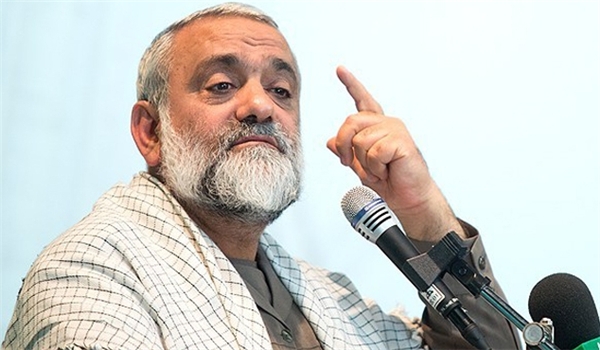
RNA - Naqdi said the US sought to push the Iranians to change course from confrontation to compromise by fooling the Iranian people through its media outlets.
"But the Iranian nation has deeply felt the depth of the US regime's betrayal and disloyalty during the nuclear talks," General Naqdi said on Monday.
Noting that during the nuclear talks and after that the US resorted to the media to force the Iranian nation to make concessions, he said, "Today, they want to replace right and wrong through media games."
Elsewhere, General Naqdi downplayed Washington's military power to confront Tehran, and said, "The US army is too weak to fight Iran."
In relevant remarks earlier this month, Supreme Leader of the Islamic Revolution Ayatollah Seyed Ali Khamenei underlined that the experience of negotiations with Washington on the nuclear issue and the other side's disloyalty to its undertakings proved that talks with the US on the regional issues is a "lethal poison".
"They (the Americans) want us to negotiate with them on the regional issues but the nuclear deal experience tells us that this (talks with the US) is a lethal poison and we cannot trust the Americans' words in any issue," Ayatollah Khamenei said, addressing a large gathering of Iranian people from all walks of life in Tehran.
Noting that the regional problems and challenges between Iran and the US are insolvable through negotiations, he said, "The Americans want to take everything in return for nothing. Negotiations with such a government mean diversion from the correct path of the country's progress, making repeated concessions and bearing their bullying, violations and disloyalty in practice."
Ayatollah Khamenei referred to the American officials' letters to Iran in recent years in which they showed respect and interest in cooperation with Tehran, and said, "We said two years ago that the nation will see the nuclear talks as an experience to see what the Americans would do in practice and now it has become clear that they are still busy with plots and destructive measures."
Noting that 6 months has passed since the start of the implementation of the nuclear deal with no tangible change in the Iranian people's everyday lives, he said, "The Joint Comprehensive Plan of Action (JCPOA) as an experience proved again the fruitlessness of negotiations with the Americans, their disloyalty and the necessity for distrusting the US promises and showed that the way for the country's progress and improving people's living conditions is paying attention to the domestic potentials and not the enemies who are continuously rocking the boat for Iran in the region and the world."
His remarks came after Iranian Deputy Foreign Minister and a member of the nuclear negotiating team in talks with the world powers Majid Takht Ravanchi complained that not a single voice is heard from the US state and treasury departments on the implementation of the last year nuclear deal with Tehran and resumption of the country's banking interactions with the world.
"Some of the problems are related to this fact that there are sanctions that are not nuclear related and they have worried certain European financial institutions and we are also critical of them and have told the Americans too that they should create the necessary atmosphere based on the nuclear deal to remove these concerns, but they are not doing so, in our view," Takht Ravanchi said last month.
"In our view, two messages are coming from the US; one from the US state department which says that there is no problem for banking and financial works with Iran and the second from the OFAC (the Office of Foreign Assets Control of the US Treasury Department) which contradicts the first message," he added.
Noting that the Iranian negotiators in their meetings with their American counterparts have many times emphasized that not only their message is contradictory, but also it is not a positive one, Takht Ravanchi said that the OFAC should give a General License to the European and other giant banks in the world for interaction with Iran or contact each bank separately, answer their questions and respond to their concerns.
"This process shouldn’t take long either," he added.
Also in July, Iranian Deputy Foreign Minister for Legal and International Affairs and senior member of Iran's nuclear negotiating team Seyed Abbas Araqchi lambasted the US for its destructive role against the resumption of Tehran's banking relations with the world states after the last year nuclear agreement.
"The Americans have not only remained adamant to building trust (between the Iranian banks and their foreign counterparts after the nuclear deal), but also played a destructive role in this regard," Araqchi told reporters in a press conference in Tehran.
His remarks came after Iranian Foreign Minister Mohammad Javad Zarif blasted the US for its negative approach towards implementation of the last year nuclear agreement, and said the Europeans are also angry at Washington's behavior.
"Every one says that the Americans haven’t implemented the Joint Comprehensive Plan of Action (the nuclear deal) in the best way possible," Zarif told FNA in July.
"The European sides also have problem with the Americans as they have some psychological concerns" as a result of the Iranophobia projects implemented against Tehran in the past.
R111/108/C/